Mila at Mission Bowling - June 24, 2025
Step 0 of 0
1

2

3

4

5

6

7

8

9

10

11

12

13

14

15

16

17

18

19

20

21

22

23

24

25

26

27
28
29
30
![[ 2025-06-25 04:23:40 ]](https://pxpbstrg.s3.us-west-1.amazonaws.com/images/thumbs/1750825450.JPG)
31
![[ 2025-06-25 04:24:17 ]](https://pxpbstrg.s3.us-west-1.amazonaws.com/images/thumbs/1750825466.JPG)
32
![[ 2025-06-25 04:24:37 ]](https://pxpbstrg.s3.us-west-1.amazonaws.com/images/thumbs/1750825491.JPG)
33
![[ 2025-06-25 04:24:51 ]](https://pxpbstrg.s3.us-west-1.amazonaws.com/images/thumbs/1750825501.JPG)
34
![[ 2025-06-25 04:25:01 ]](https://pxpbstrg.s3.us-west-1.amazonaws.com/images/thumbs/1750825512.JPG)
35
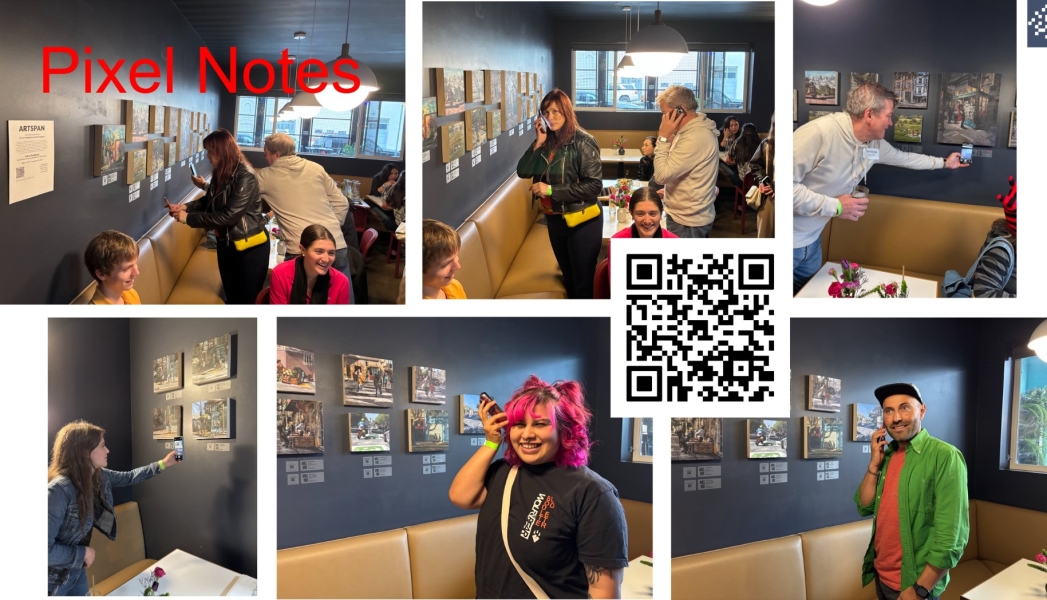
Mila Kirillova (right) and Eleanor Bigelow
Mila Kirillova at Mission Bowling - Exhibit photo 1
RSVP here - June 24, 2025, 5-7pm, Mission Bowling.
Transcript: Alright, so I'm Mila, I'm a fine art painter. I've come into fine art by the way of animation. I graduated from an art school as an animator. I worked in the film and visual effects video game industries for over 10 years. And I started painting first in parallel, and then it became my main thing. The other thing that you could see in my work is that I'm a city girl. I grew up in the city. I feel and understand the life in cities and in my work, I kind of gravitated to that eventually. I also kind of feel like cities are great, but without people, the city always feels empty for me. The architecture is interesting, but it's really a combination of the cityscape and the people in it that to me make it feel real and make it feel alive. And I love a good light. A good light for me really makes a picture I search. For a good light source, people have told me before that, “Oh, it's always sunny in San Francisco in your paintings, what a great weather you guys are having over there!" And I'm like, yeah, well, that's how I like to paint it. So in a lot of my paintings, especially the smaller paintings, I focus on maybe a specific street corner, a specific storefront, a scene that I noticed when I was walking by, maybe a person that I found interesting. And I feel like all these paintings, they come together kind of as little puzzle pieces, and they form this big picture of what a life in the city is like, the way I see it, the way I feel it, the way I observe it.
Exhibit photo 2
Note 1 Transcript: So the current show, I've come across this idea that Artspan had to do a show about the mission, and I've painted in the mission for years. What brings me to the mission in the first place is the City Art Gallery. It's an artist coop on Valencia. I've been a member for some period of time, and I, I end up in the neighborhood a lot and I found it very vibrant and very interesting and very much alive. And I started looking through the paintings that I've created over the last five, six years. And as I kind of kept finding all these images of all these things that I painted. They came together and they started to form this story, story of what. The neighborhood has been like. I've been noticing some storefronts that have changed and they're not around anymore. And others were recognizable. I realized that I must have painted dog-eared books like, I don't know, a dozen times by now. And I put them all together and a lot of these paintings, they're not with me anymore. They found their happy forever homes and some of them actually reside in the neighborhood itself. and others have traveled a very long way. Uh, I think one of them has gone as far as Singapore and All of a sudden here they were all together again and the story of the mission neighborhood over the last few years that I, the way I have seen it was here in those paintings. So I, I thought it was a great idea. I was really excited to put it together and Have it, you know, have the paintings tell the story.
Note 2 Transcript:
Tom Paper: All right, so we're back with Mila, uh, and I asked a question about how is it that you got all these prints back from Singapore or wherever and, and tell me what, what it doesn't work that way.
Mila Kirillova: I did not get the paintings back. The paintings. Forever, uh, happily ever after. However, uh, we decided that one way we could do this and tell the story would be to actually do a series of fine art prints of the paintings that we selected from, you know. 2, 3, 4, dozen paintings of the Mission that I had. And uh it was my first ever project with prints, so I've learned a lot about, you know, what a print is and what makes a good print and how you make it look. I felt like I had a certain, certain idea of what I wanted them to look and feel like, so. And that that was the opportunity to really, really bring it all together because as an artist, as a working artist in San Francisco, you know, nobody really hoards their work. We paint, we sell it, we, we, we make connections with people who buy our work, we paint more. It's sort of a part of the process, but this was such an exciting chance to kind of look back over the last several years and, and kind of bring it all together.
Tom: And Artspan helped you put this together?
Mila: Well, Artspan said, yes, go ahead, you can do it. And then and then I figured out the details.
Tom: And tell me just a little bit more about your um Your love of the city and your love of the Mission. Why? Where does this, where does, what's the beginning of your love of a city? Can you go back to like when that first triggered in you?
Mila: Well, I have come a long way from the place where I was born. I was born in Ukraine. Well, technically Soviet Union back in those days, I came to the U.S. as a college student, and I remember my first time in California, my first time in San Francisco was probably, I wanna say 1999, and I kind of Immediately from my first visit, I felt a connection with the place and I do not know what it is. I've tried to rationalize it and kind of try to understand it, but I felt like this whole feeling of a place where a lot of people have come from many different parts of the world to really find who they are, to try new things, to try and build a new life, a city that accepts all these people and allows them to find a niche for themselves. And for some reason I felt like I felt like I was fitting in. Not necessarily, because no one fits in, and that was the whole point, like we're all different, we're not supposed to, you know. Conform to some sort of standard. We, we just, we just kind of show up and do what we want to do. And, and it's really, I guess on some really deep level I connected to that. And the Mission is one of these neighborhoods that I, I feel like is so San Francisco. It's such a, it's such a melting pot and such a mosaic of all, you know, all the things that San Francisco is and the City Art Gallery, I've been affiliated with them for a few years and it's a great artist co-op, you meet other artists you meet art lovers, you show your work, you interact with people, and I've been a part of that for a while. So you, you, I kind of end up, you know, walking up and down Valencia Street 2 or 3 times a month at least, if not, you know, 2 or 3 times a week.
Tom: Are you a book lover?
Mila: I am a book lover. And Dog Eared Books is such a neat place. I felt like it was such a combination of an independent bookstore, kind of like a community center, you know, in a way. Uh, it also is very artistic and as I found out later, the person who owns the bookstore is actually an artist herself. It's such a, it's such an exciting spot and, and just a beautiful storefront too, you know. So I ended up like my first painting of Dog Eared Books, I think was done in 2019 and for some reason, I, I keep coming back to that street corner and at some point I was like, hm, I do have a few paintings of Dog Eared Books.
Tom: That's funny. Do you have any favorite, um, foods or restaurants or, uh, uh, or places, uh, other places, uh, in the Mission?
Mila: I just, I kind of like to explore. I like to walk around, I find Paxton Gate extremely fascinating. It's a little, uh, I can't call them a taxidermy shop. They're kind of like an everything shop next door. And, and they're just like, you never know what you're gonna find when you walk in. Um, the food is always exciting and some places that I liked, they changed and went away, but there's always something new popping up. And uh yeah, it's, it's, I don't know, I just kind of
Tom: Is it your favorite neighborhood in San Francisco, one of your favorites?
MIla: It's one of my favorites. I mean, I, it would be really hard to say, oh, this one is my favorite because every neighborhood has something going on. Yeah, North Beach has its own character and its own feel and the Castro has its own feel. The Mission has its own feel. And if, you know, you end up somewhere around Twin Peaks, the views are magnificent and good luck with the wind. Yeah, but yeah, as a plan painter, I'm like, uh, I'm very intimately aware of all the intricacies of San Francisco microclimates.
Tom: OK, well, thank you very much. We're gonna now jump into talking about the paintings.
Just Like the Sixties
Transcript: Just like the Sixties, it's the title of the painting. So that was 2020, and I just looked across the street and I was transported into a different time because, you know, this wall, I had this really bright kind of graffiti tie dye pattern, rainbow pattern on it, and the ladies were walking by, you know, wearing bell-bottom pants, carrying protest signs, and I thought, Yeah, not that much changed really.
Dolores Hill Bomb
Transcript: This is one of the paintings of the event that was happening in the Mission at one point, which was called the Dolores Hill Bomb. The skaters were riding down Dolores Street, and it was a fascinating event to watch and a little bit scary, even though I'm not a skater myself. So yeah, it's just one of those little snapshots of what you will find if you walk along the street.
No Parking
Transcript: That is a view from the window of Ritual coffee shop on Valencia. And in the summertime, around, I wanna say early June, when the sun is high enough, in the afternoon it hits the opposite wall, the buildings on the other side of the street, and the light is just beautiful and the shadows are really great.
Mission Solstice
Transcript: Oh yeah, well, these are not Victorians, they are probably Edwardian buildings. Those things are really a pain to paint because of all the perspective and angles and the multiple angles, but the light was just great, it was such a beautiful afternoon, and I just got caught with this whole symphony of light and color. It just feels like a nice and sunny day in the Mission to me.
Etcetera
SpotLite
Transcript: That's another street corner, I believe it's Guerrero, uh SpotLite Market. I really got drawn to this summer light. And sort of late afternoon summer light and It's very recognizable. The person who bought this painting, um, told me that's like, "Yeah, this is the neighborhood we live in, this is what we know. It just feels like the city we love."
Dog Eared 01
Dog Eared 02
Dog Eared 03
Transcript: Dog Eared Books, that street corner is very interesting because it is actually a north-facing wall. So in order to get the sunlight to hit the wall of the bookstore like that, you pretty much have to be there within a week or two of the summer solstice. So this is what late June, early July light would do on that street corner, but if you miss it, it's gone and you can get it for another year.
Dog Eared 04
Just Another Day in Paradise
Transcript: Mission Dolores Park. Yeah, it's one of those scenes that you kind of want to paint and you're a little bit intimidated by how complex the skyline is. But I feel like that one actually worked out and the painting was created for a project that was called "Postcards from Paradise." And I thought, well, what can be more idyllic than a nice sunny afternoon in Mission Dolores Park?
Yellow Coat
Transcript: This is a snapshot of the street life, street life on Valencia, Valencia and 19th, I wanna say. And a bit of an ode to San Francisco microclimates, you always need to bring a coat, but you may end up in a situation when the weather's too warm and then the coat comes off. So the original title of the painting was It's Too Hot for that Yellow Coat.
Protesters and Dog Eared Books
Note 1 Transcript: So this is a snapshot of a moment in time. This was 2020 and was the day of a large Black Lives Matter protest at Mission High School. So it is my favorite corner with Dog Eared Books bookstore, and all these people were just streaming along the street with their signs on their way to the high school and I kind of wanted to capture that I wanted to create this, um. The scene of, you know, that would capture the feeling of all these people in motion going somewhere and the energy that was driving everybody that day. I hope that it translates in this painting. I think it kind of did. I really like it.
Note 2 Transcript:
Tom Paper: So I'm, I'm really curious, Mila, about your process. Do you, can you tell us more about your process and do you, do you stay there and paint or do you take a photo or how do you recall?
Mila: In this particular case I did not. It's the process is different for different paintings and the plain-air pieces you stay on the spot and you create it while you're there. This one, I didn't. I was actually in the car as you could tell from my angle, and I was stopped at the traffic light and just kind of watching the street scene around me and um. And I was just so, so absorbed in it, and I took a few snapshots out of the car while the light was red. Um, well, I think I painted it green in the painting, but it was red. I see that. And, and I came home and I was looking through all these pictures, kind of trying to remember, you know, and once you've painted a certain spot. You know what the light is doing, you know what the colors are like you kind of feel what you're looking for. And this painting was kind of an amalgamation, sort of a collage of all these things that I saw in these few minutes while I was stopped at on that street corner.
Dog Eared After Dark
Transcript: Right, so this was a large painting. I did a lot of smaller works, uh, with Dog Eared Books, kind of little quick paintings, quick studies, and I decided finally to do a large one. there was a show coming up and uh the theme of the show was a moment in time. And I thought, what, what a better, what a better moment in time than somebody absorbed. In the moment, you know, reading something in the window of a bookstore, and I created this particular painting to sort of have a feeling of this. I don't know, this bookstore always feels kind of like a magical portal to me, especially in the evening when you're walking by and the lights are on inside and like all these books are staring at you from the windows and you just feel that you would walk in and disappear into a different dimension. I kind of wanted to to have that feeling.
Tom Paper; How big is the original?
Mila Kirillova: This was 36 inches tall.
That Bike Lane
Transcript:
Mila Kirillova: Oh, the bike lane that is no more. One of those things that existed at some point does not exist anymore, but I made a painting of it.
Tom Paper: And were you a fan or not a fan of the bike lane down the middle of Valencia?
Mila Kirillova: I don't ride. I don't cycle in the city, so I really kind of felt that. I just didn't know. I just didn't know. I could tell that there was an attempt to make things better, how well it worked, it was really hard for me to tell. I know that the opinions were kind of split, so, uh, we'll see how the new one works. It feels like it might be working better. We'll, we'll see. It's all very new.
Fruit Stand
Walking With Mom
Transcript: It's an afternoon in Valencia. You get, you get really nice light at all the crosswalks because the sun is shining just downhill, you know, down the cross streets and. Uh, I just love doing people watching. I just love, you know, to see people walking, going about their business and And there's an animator, I, I, I kind of want to capture the character and the post, and you kind of feel like, you know, what the person is all about, even though you're looking at at them from the back, you've never met them, but you feel like you, you understand who they are. I didn't tell you, but I've been to Kiev once and I remember walking, I shouldn't, I remember being in the square in the middle of the city. It's just you, you know this area because we were there at night. The main square, yeah, the main square and, and people, there were people everywhere and they were all sort of walking. It was like a, like an almost like walking around a track, but there wasn't a track there, but there were just people walking and looking at each other and. Yeah, you just hang out on the nice if the weather is nice, you just kind of go and you know. Yeah, yeah, yeah, that's why that's why I like cities and I like people watching and I kind of like this whole thing, you know. Great
Dolores Afternoon
Transcript: So an afternoon in Mission Dolores Park, which is kind of. Uh, in the mission is our living room and our gym, and our, um, dining room and our party spot. It's, it's everything at the same time for, for everybody. You know, you really, the, the, the light is the, the, the feeling of light, and I mean, I just, I feel like I'm there, um, and I know what this, I know exactly how this would feel, um, because I've been there at this. With this kind of light, you really do an amazing job with that.
In Our Circle
Transcript: So this is Mission Dolores in 2020 when we had those circles on the grass and people would sit inside the circle and everybody would have their own circles. And uh it's a moment in time. I think by 2021, they were gone, but, but it's, you know, it's sort of a page from the history that we all live. Yeah. Yeah, it is interesting to think about all these uh paintings and how many, like the bike lane, uh, the things that are, are no more. Uh. Yeah. Yeah, I feel like it's a story, you know, of the last 56 years because I, I've noticed more than once that I would paint something and the next time I walk by that inter intersection would change. A restaurant went away or the storefront got repainted and I was like, oh, but in my painting, it stays the way it was forever. Yeah.
Dolores Hill Bomb
Place a DOT on the image


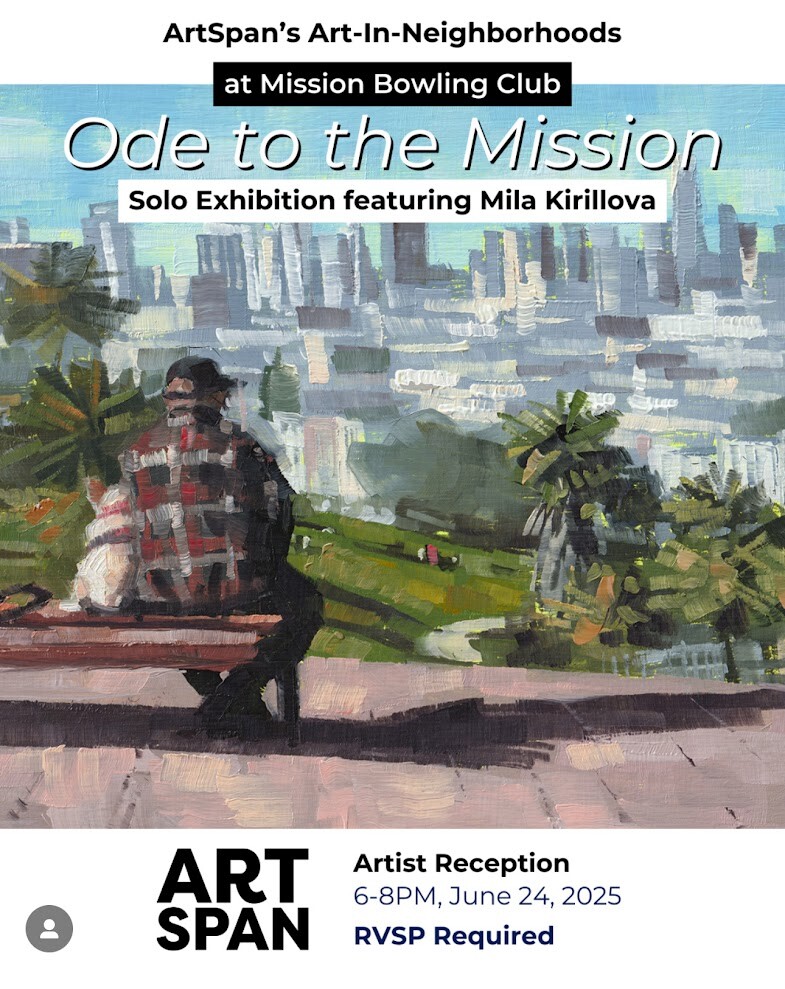
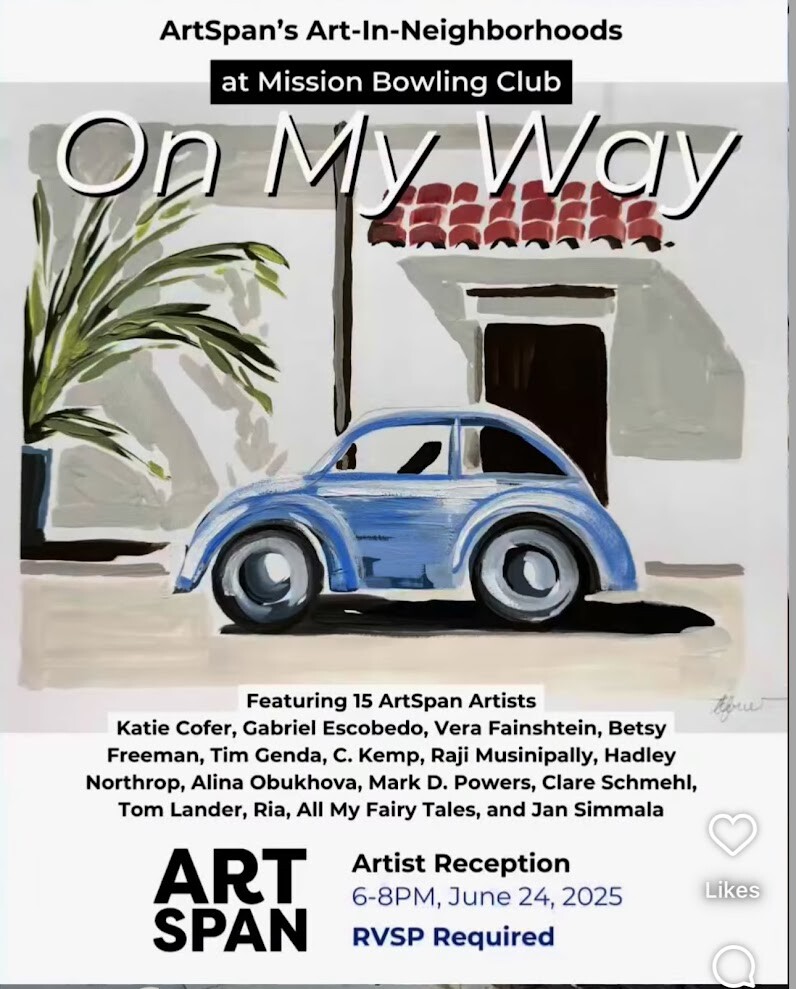
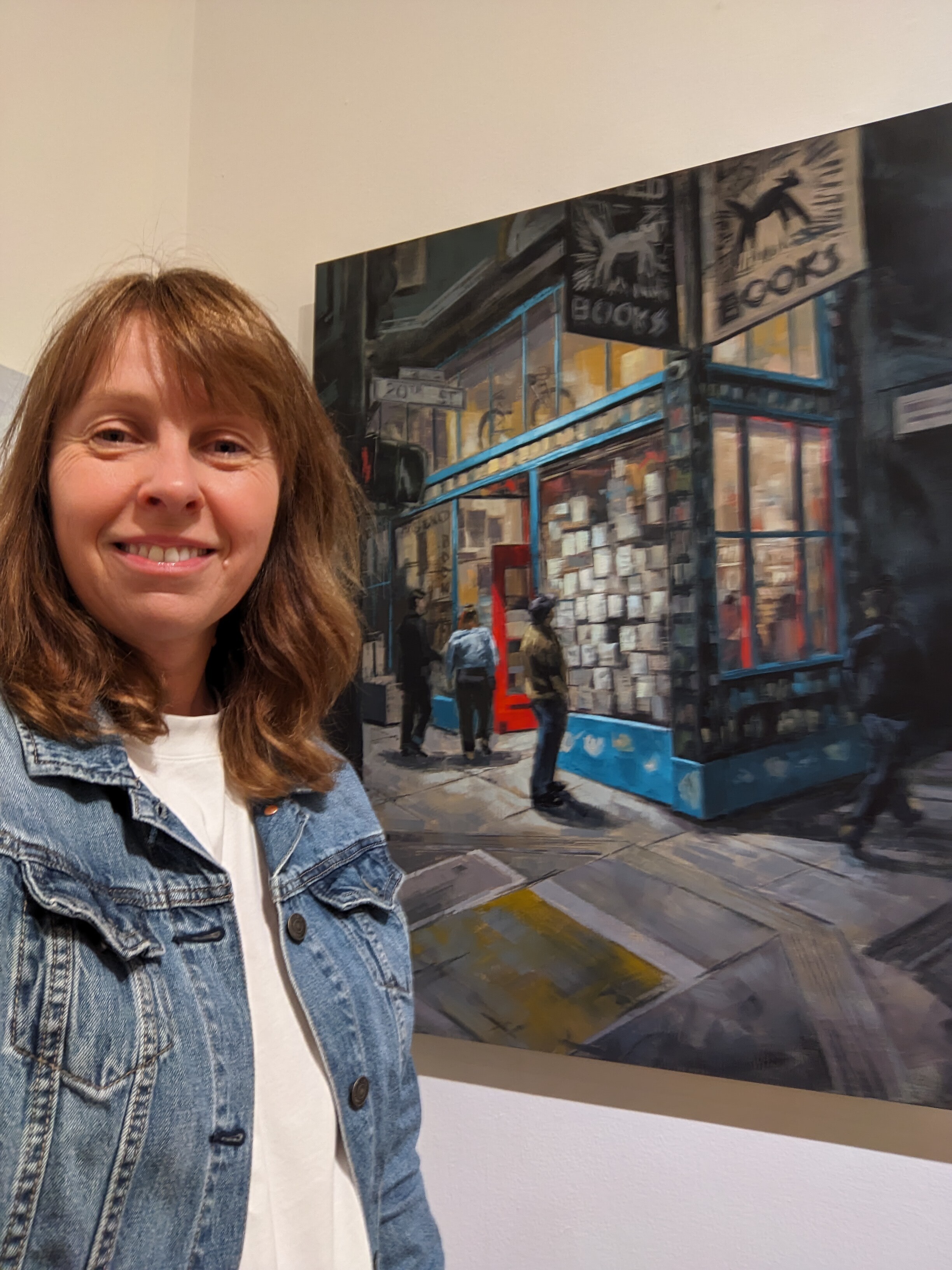
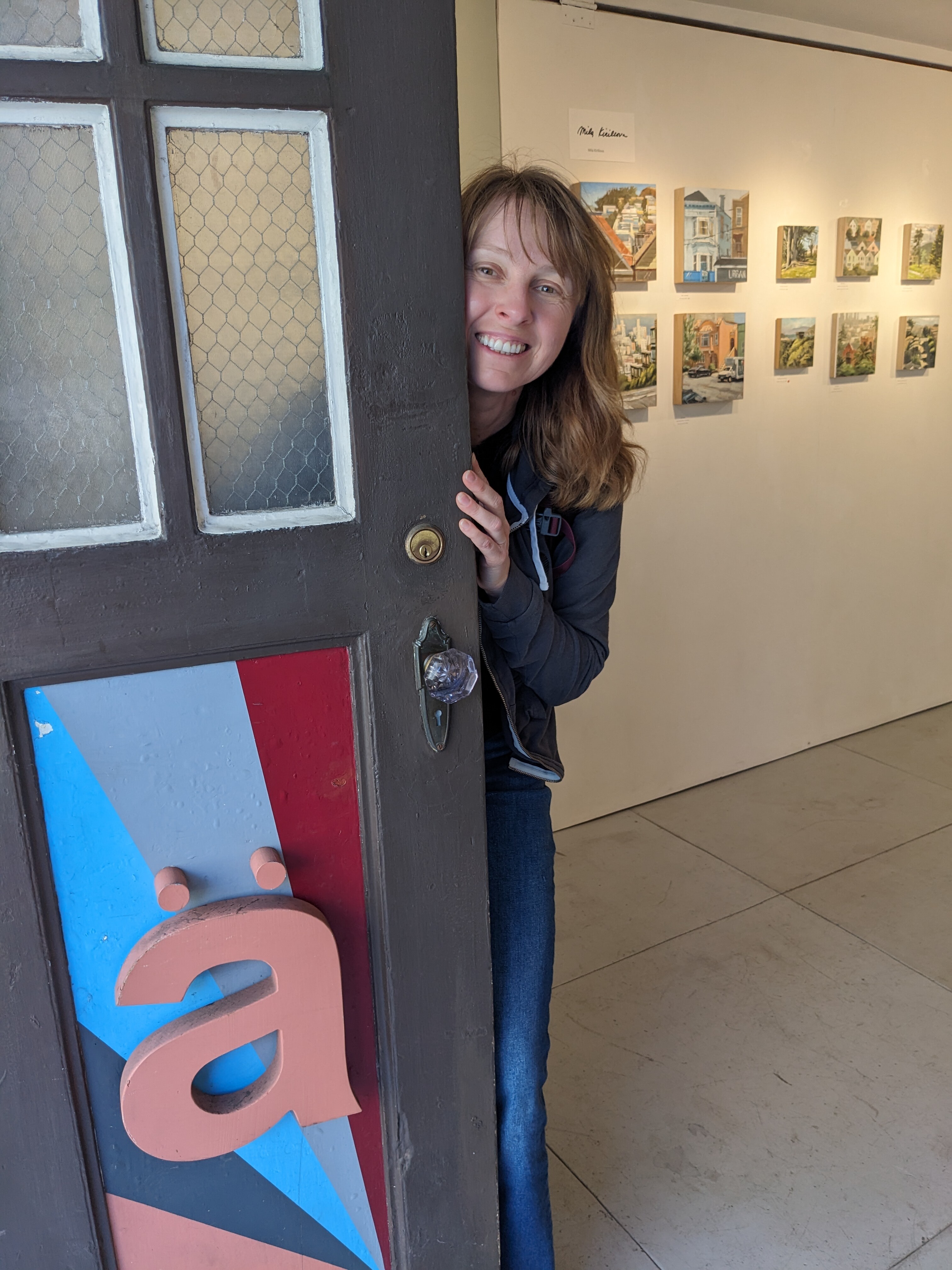
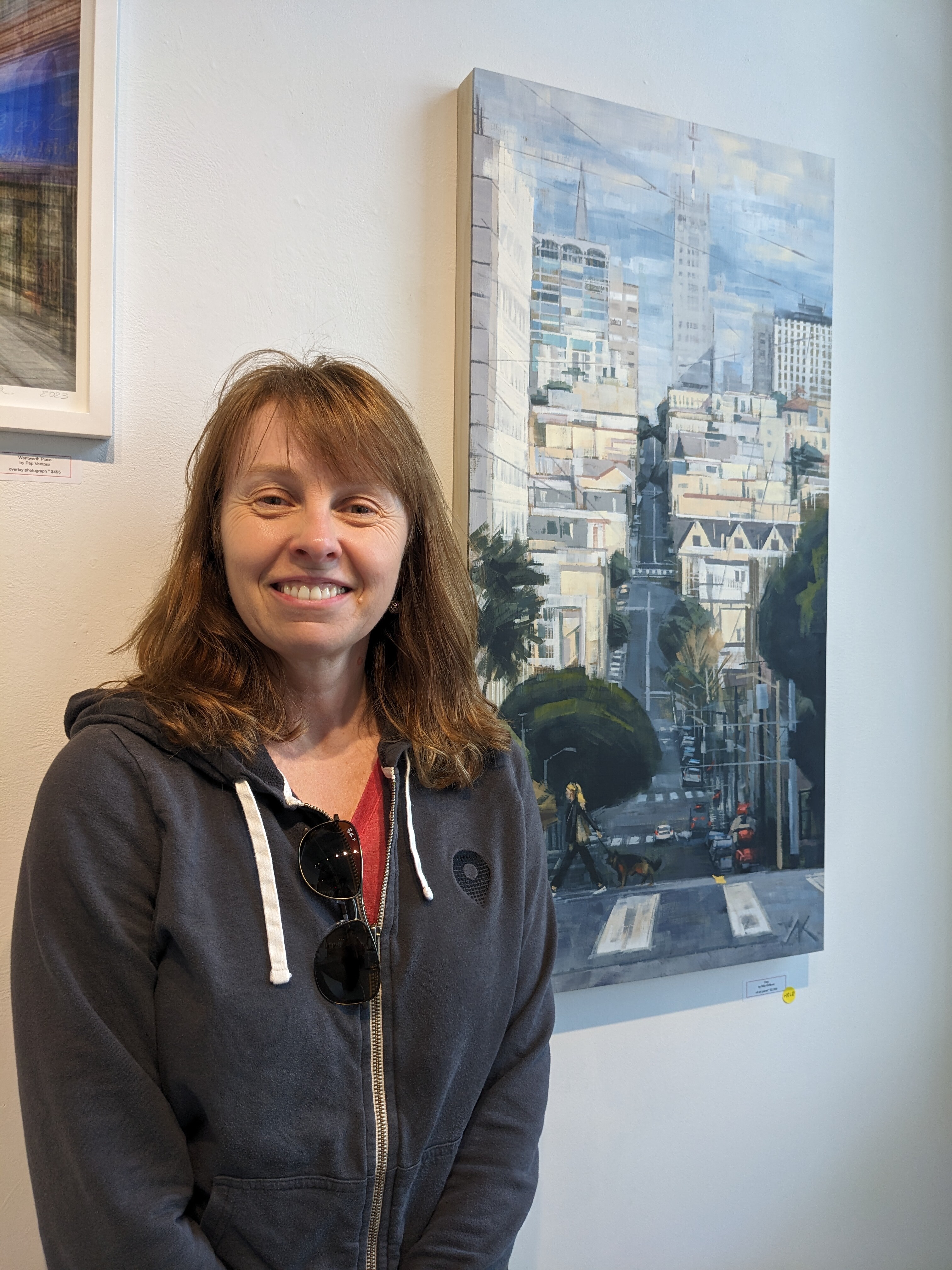
No dots yet